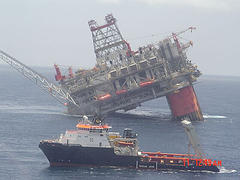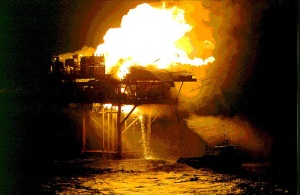
The Indonesian PSC: fire-fighting before it's too late
A recent study on fiscal system competitiveness and attractiveness conducted by Wood MacKenzie found that the Indonesian PSC ranks at 88 amongst 103 countries. We are at the bottom quartile ! Now, let’s see the facts and figures to draw a conclusive conclusion if this is true or just a meaningless survey which we can easily ignore.
The last new PSC bidding round back in December 2007 took about 5 months to close, longer than usual. Part of the delay was caused by the changes proposed by the Government (MIGAS) with regards to ring fencing at PoD level rather than the PSC, title to assets and equipments before full cost recovery, etc. At some point there were time consuming debates on arbitration court, payment of taxes in kind rather than in cash, and so many other issues (which later on were mostly changed back or dropped). The delay was probably also intentional to wait for and lure more investors as well as to timely schedule the signing of the contracts at the opening ceremony of the 2008 IPA convention. Well, there were not that many signed. About 21 blocks oferred failed to attract favorable investors. Minister Purnomo was quoted today on daily Republika that the prospective investors on those 21 PSCs did not meet the requirements (on signature bonus and exploration commitments). We should ask the question whether probably it was the commercial and fiscal terms which did not meet the investors’ requirements !
Inability to attract investors amidst record-high oil price environment that we have today actually is straightforward and downright obvious. It is true that this also means that the prospects being offered are definitely not exciting at all, something on which we have limited control, but the fiscal and commercial terms are definitely within the government’s control. They should have been utilized to manage and compensate the fact that the exploration prospects were not attractive. We can always re-bid those blocks in the next round scheduled in October this year, but we have lost a timeframe in the momentum of this long-term business. Without changing the terms and managing expectation, we should not be surprised if a majority of those blocks will fail to find investors yet again.
How do we actually compare in general with PSCs in other parts of the world ? In reality, we should compare our terms with any types of petroleum contracts, not just PSCs, in any countries. The race for finding new reserves should be at its peak today. Major oil companies are making highest-ever profits, and they are looking at their extensive portfolio to re-invest their returns. Projects which were previously not economic suddenly look pretty enough to throw money in. These giants always manage their reserves like an assembly line on a conveyor belt. If they decided to develop discovered reserves, they have to make sure new discoveries are being added to secure a sustainable reserves replacement ratio ensuring long-term growth. The oil companies do compete with one another to bid for new exploration blocks, but we should always note that governments of the countries offering contract areas are also competing with one another. Uncontracted blocks tell us the strong message that we are not winning the race, at least it looks like we are behind, or even worse: we probably have not started when others have accelerated at full steam ahead leaving the launching pad. The current confusing development on limitations of cost recovery, threats to impose new taxes (windfall profit, crude export), or changing the format of the contract (to a non PSC type, or a PSC without cost recovery) only worsens the situation. In a world-scale race like what we have in this industry, less certainty spells trouble and investors will walk away from countries which can not even guarantee certainty in fiscal, commercial, and legal systems.
To narrow the scope, let’s have a peek on PSCs in other countries and see how much better they are compared to ours. Angola offers uplift on new development, allowing contractors to cost recover more than what they spend as an incentive to invest in new projects. See the contrast to what we do today in Indonesia, basically trying to do the exact opposite: allowing less cost recovery relative to what the contractors actually spend (recent disallowance of recovering community development costs is a good example). The Angolan PSCs use sliding scale Rate of Return for profit split: the lower the RoR, the higher the contractor’s share, ranging from 80% at the highest when RoR is low to 30% at the lowest when RoR is at its maximum high (a most likely scenario when production and price are high, provided that most costs have been recovered). With a 50% tax rate, the worst after tax split is hence 15% which in reality is more than that given the uplift.
Azerbaijan offers similar incentive for capital expenditure uplift, and the profit split is also based on RoR but further adjusted for inflation. The highest split for the contractors is 70% and the lowest is 20%. With a tax rate of merely 25%, the lowest after tax profit split is 15% which again in reality is higher considering the uplift.
Looking at the typical Indonesian PSC for oil, the profit split after tax is 15% in general, but in reality the investors actually get less as the Domestic Market Obligation (DMO) is compensated by the government at a much lower price ($0.2 or 10% of ICP or 20% of ICP per barrel). We do have capex uplift in the forms of investment credit (for oil) and Interest Cost Recovery (ICR, for gas) but they are very selectively given. Once granted, those incentives sometimes are still questioned and challenged as certain parties misunderstand them as recovery of financing costs which contractually is not consistent with the PSC itself or the premise that the investors should be financially capable and hence no financing costs shall be chargeable to operating costs. Those parties do not understand that it’s not about how financially capable the oil company is, it’s all about how economically viable the project is. An incentive is given to stimulate investment and to improve project economics, something which we MUST do to compete globally.
In reality, of course, it’s not about the format of the petroleum contract or the fiscal or commercial terms which lure investors. It’s more about the hydrocarbon prospect, which when combined with the contract terms, gives a favorable bottom line economics for the investors. If we have a giant reserve with low cost operation, less favorable terms are still acceptable for them. But then again, when was the last time we had a giant discovery in excess of 2 billion barrels comparable to those in Angola or Azerbaijan for example ?
We are shouting panicly about imposing windfall profit taxes or crude export taxes amidst the high oil price we have currently. Why don’t we look around and see if any other PSC countries do anything like that at all, considering they have similar arrangement and comparable profit split with the PSC contractors. I suspect that obviously we’re the only one making a big fuss about it. Indeed certain non-PSC countries have imposed higher petroleum taxes, but those are in the tax & royalty petroleum contracts where the governments truly get less than the oil companies, not in a PSC where the government already takes 85% of the windfall profit. As I raised over and over again in other articles, we are mixing state budget issues with the aspiration to have a bigger government take in the oil & gas industry.
We surely don’t want to miss the train nor to completely blow up the race to find more reserves and fully take advantage of the record-high oil price. We should quickly get our acts together, resolve all disputes, drop all controversies, and immediately launch our departure to catch up with others and re-claim our position in the global oil & gas industry.









